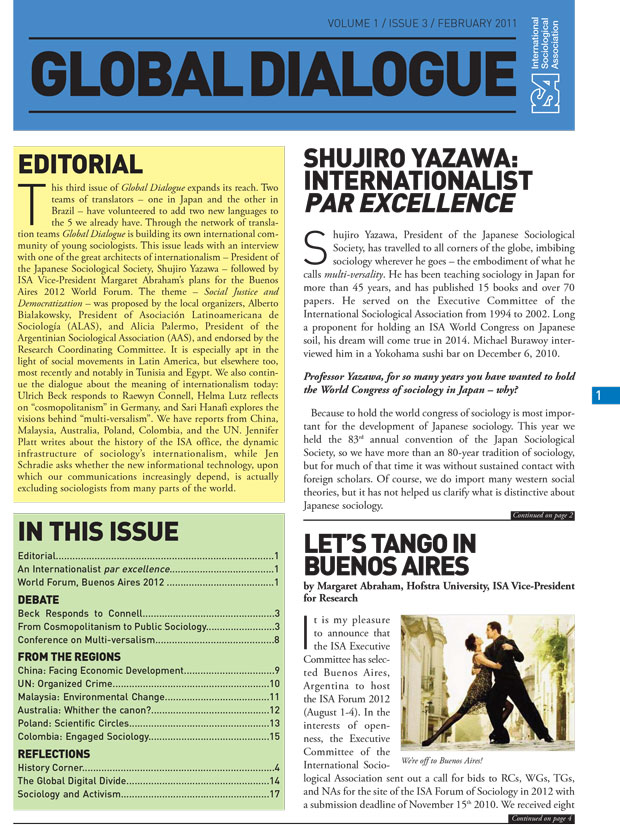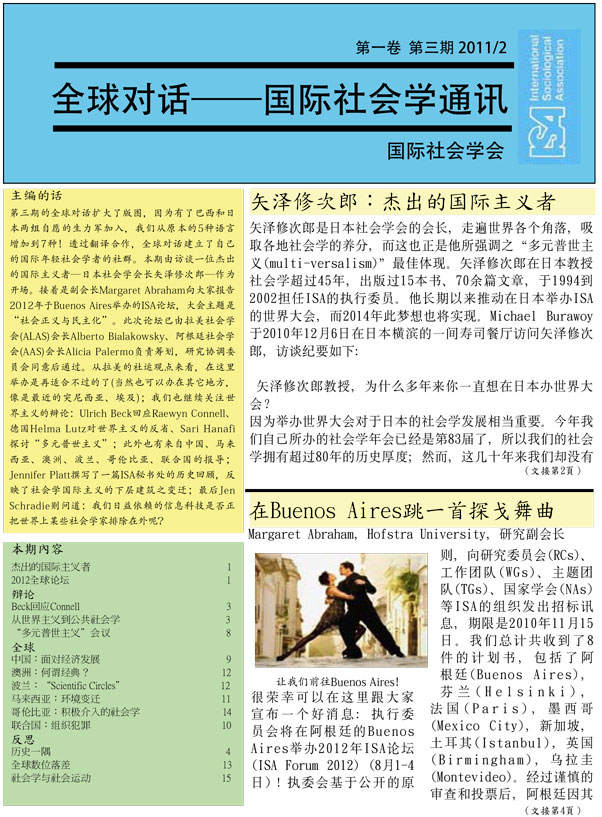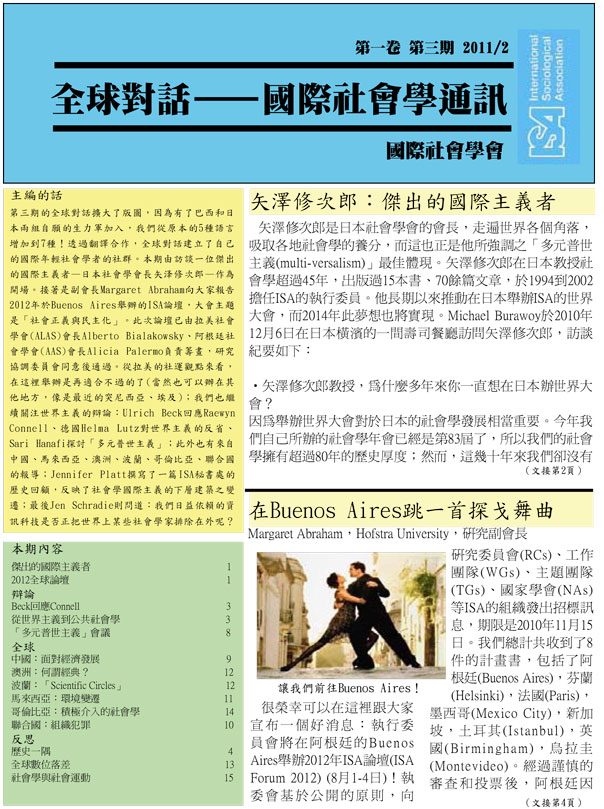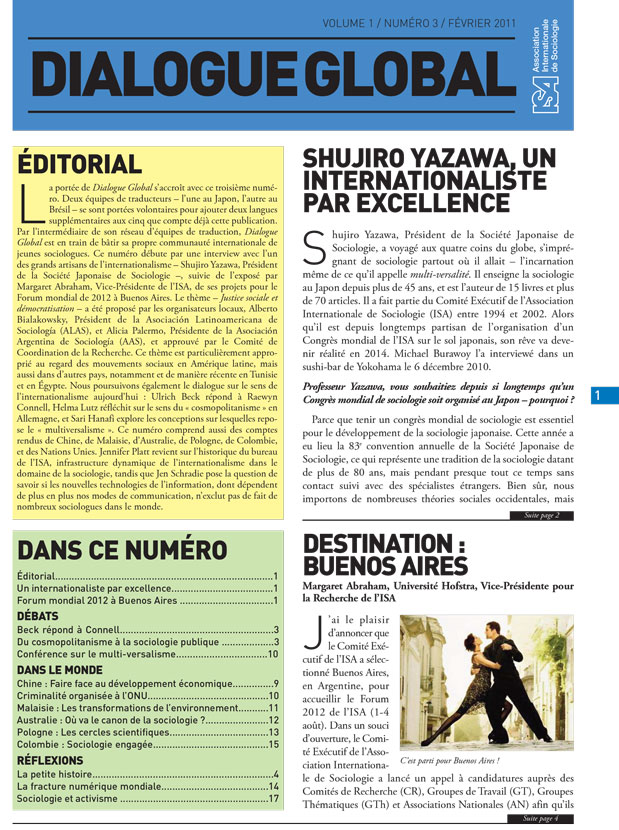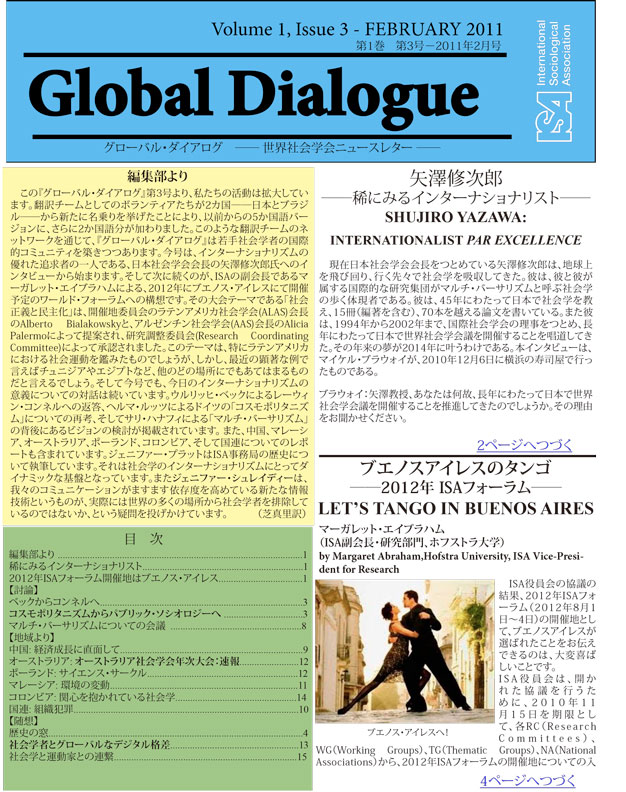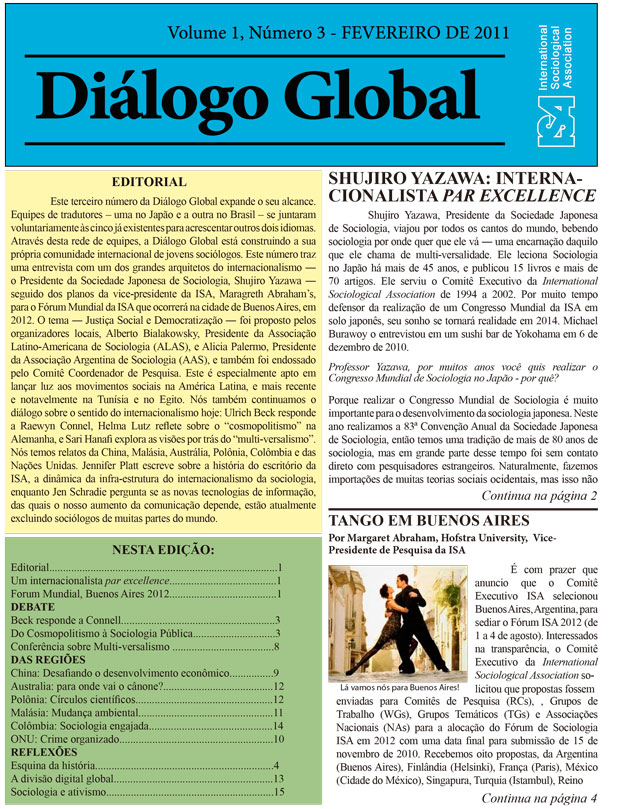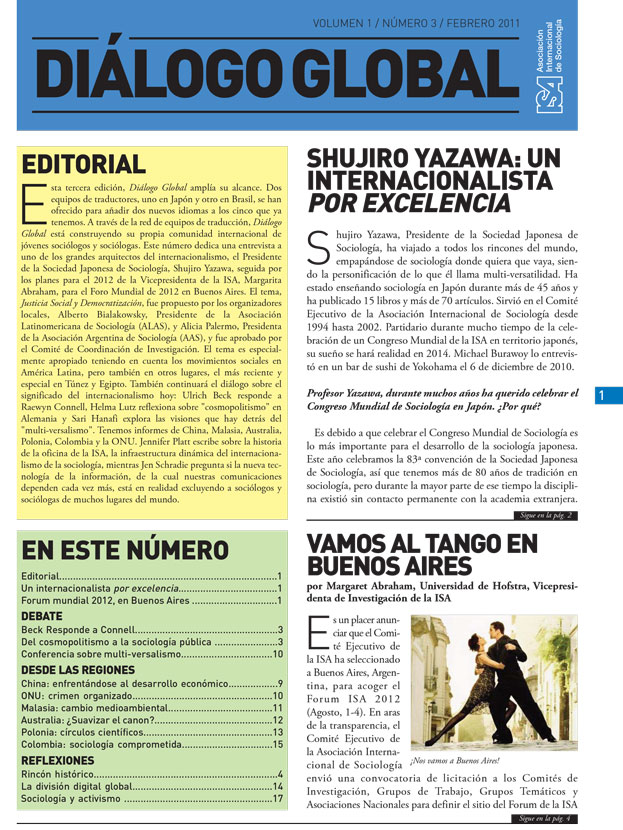Shujiro Yazawa: An Internationalist Par Excellence
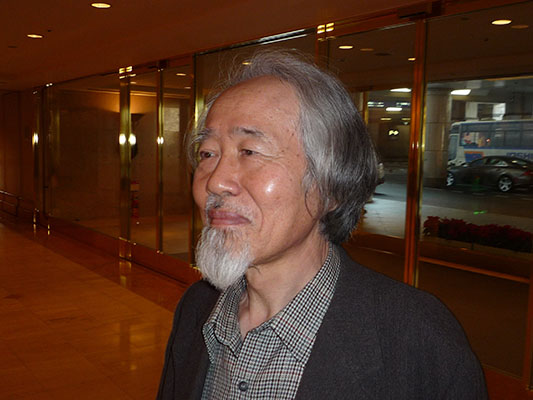
February 16, 2011
Shujiro Yazawa, President of the Japanese Sociological Society, has traveled to all corners of the globe, imbibing sociology wherever he goes -- the embodiment of what he calls multi-versality. He has been teaching sociology in Japan for more than 45 years, and has published 15 books and over 70 papers. He served on the Executive Committee of the International Sociological Association from 1994 to 2002. Long a proponent for holding an ISA World Congress on Japanese soil, his dream will come true in 2014. Michael Burawoy interviewed him in a Yokohama sushi bar on December 6, 2010.
MB: Professor Yazawa, for so many years you have wanted to hold the World Congress of sociology in Japan – why?
SY: Because to hold the world congress of sociology is most important for the development of Japanese sociology. This year we held the 83rd annual convention of the Japan Sociological Society, so we have more than an 80-year tradition of sociology, but for much of that time it was without sustained contact with foreign scholars. Of course, we do import many western social theories, but it has not helped us clarify what is distinctive about Japanese sociology.
For example, I am writing an introduction to Japanese sociology for an international journal, but I cannot find a defining theme of Japanese sociology. So what is Japanese sociology? Of course, we can provide many different answers, but even among Japanese sociologists we don’t know the essence of Japanese sociology. We have imported many important sociologies—western sociologies—but, generally speaking, Japanese sociologists have been good at understanding or interpreting western sociology, whereas we really need to be explaining Japanese society by using western sociology. For this we need to combine western sociology and Japanese sociology. That is why I would like to organize this congress, in order to develop Japanese sociology with a universal orientation. Of course, I don’t mean universality in a singular sense of modernity, but rather as part of a kind of multi-versality.
MB: What do you mean by multi-versality?
SY: Multi-versality is not my term. It is associated with Michael Kuhn and the World Social Science and Humanities Network, and there was just recently a conference on the subject in Buenos Aires [reported in this issue of Global Dialogue]. In endorsing multi-versality I am supporting multiple universalisms, indigenous universalisms. For example, when we go to a sociology conference in East Asia – Korean sociologists tend to stress national tendencies of Korean society or Korean history. The same applies to the Chinese. But Japanese sociologists tend to stress European and American sociology without any national tradition of their own. Influenced by the Chinese and Koreans we are trying to develop our own universalism – a mixture of national tradition and Western or American sociology.
MB: Has there been resistance to having the ISA Congress here?
SY: No, no, no. Of course, the ISA has asked us to hold the world congress in Japan several times —I can remember three times since the 1960s—but each time many thought we were not ready, because we didn’t have the financial resources. So one problem is getting money to organize a world congress of sociology. At the same time, others do ask what is the merit of holding a world congress of sociology in Japan? Because we have a relatively big internal market, professors can sell many copies of their own books, and thereby boost their reputation without going beyond Japan, without having any reputation among international scholars. They have little interest in international competition, and when I proposed to hold an international congress some complained that I am too oriented to foreigners! In Japan we have a very clear distinction between the few internationally oriented sociologists and the majority of nationally oriented sociologists. So it takes an exceptional initiative to hold a world congress here in Japan.
MB: Have you always been an internationalist?
SY: Yes. I was born in 1942 in Ginza and, although I was quite poor, my playground was the department stores where they sold foreign goods. When I went to the department store I always would go to the fifth floor to gaze at the sports equipment, especially baseball equipment that came from the United States. Also, I regularly went to the public library to study because at that time it was quite difficult for me to find a place to study at home. They divided the library into a section for children and a section for adults, but I always spent time in the adult section. I loved to read books, any books.
MB: Tell us about your education.
SY: Well, I learned English in junior high school. But also my father owned a printing house that specialized in printing English books. So he knew English quite well, and through him I learned to read. In high school I was already a radical and in 1960 I joined the movement against the Japan-US Treaty. Unfortunately the protest was defeated by the time I entered the University of Tokyo in 1962. The student movement was already declining. We organized many demonstrations, but few participated, and we were always outnumbered by the police! You studied sociology at university – but what sort of sociology existed in Japan in 1962? I think we should say it was a kind of strange mixture between Parsonsian structural functionalism and Marxism, and in between these two tendencies we studied Weber, Simmel and Durkheim. Both structural functionalism and Marxism were quite influential among mainstream sociologists, because they both tried to explain society as a whole. Soviet Marxism was important because at that time the Communist Party of Japan was quite strong. But there were other Marxist tendencies, including Western Marxism. Indeed, by the middle 1960s there were even Japanese translations of Antonio Gramsci so that when I attended the first International Conference on Gramsci in 1973 at Washington University in St Louis, I became a kind of teacher to American students and professors who did not know Gramsci.
MB: So you did your PhD in sociology?
SY: Unfortunately, at that time it was not customary to write a PhD thesis, although some sociologists would do so later on in their career. Until the late 1980’s, the majority of sociologists only wrote a master’s thesis. In my case it was devoted to Sociology and Pragmatism. I wanted to study the main characteristics of US Imperialism. You know after the Meiji Restoration we imported and imitated so many foreign theories that we became imperialists ourselves without even knowing it! We misunderstood those Western theories, so I decided to study American pragmatism as a kind of ideology of US imperialism. I mainly studied William James, and John Dewey, comparing these two with Charles Sanders Peirce, and then under the guidance of the well known Japanese Parsonsian, Professor Tominaga, I studied the relationship between pragmatism and structural functionalism.
MB: So you are deeply imbued with American sociology?
SY: Oh Yes. And after I finished my MA I spent three years at Washington University in St. Louis. At that time I got a Fulbright scholarship, so I was quite free to attend different seminars and lectures. But, I also wanted to participate in some kind of social movement in the United States. So, for example, I joined a protest against a wine company that was treating its workers badly, and I assisted the rank and file labor union movement. I think it is essential for us to study social movements if we are to understand society in depth.
MB: And you were also spending time with the great radical Alvin Gouldner?
SY: Yes, indeed. But the problem was, although Professor Gouldner seemed quite radical, he didn’t participate in social movements. It was just his ideas that were radical. I attended his seminars, and I remember well the one on how to write a PhD thesis that was based on the research behind his own books, Wildcat Strike and Patterns of Industrial Bureaucracy.
MB: So after St. Louis you returned to Japan to teach, but what did you do with all your radical sociology?
SY: Yes, I had no obvious audience. The student movement had disappeared. I wrote many journal articles and books, but unfortunately no more was there a relationship between my theory and my practice. I spent my time on campus. I taught women students at Tsuda College and many graduate students at Hitotsubashi University. Many became professors in Japan and some even became professors in the United States. Do you still think of yourself as a radical? Oh, yes. I am against the Empire system. I always think of myself as a rank and file sociologist. Do you think the United States is still as strong an empire as ever? Yes. Of course, the form of imperialism is changing—from imperialism to empire. [Laughs] The hegemony of the US continues. But there are good things too – the American Revolution is one of the most humanitarian revolutions in the history of humankind. So in that sense I like American people but not American mainstream politicians! And also I don’t like mainstream sociology! [laughs]
MB: Do you think Japan is an imperial state?
SY: In a sense. Indeed, one of the most important questions is how to overcome imperialism in Japan. After World War II we had a very good chance to overcome imperialism, but unfortunately we failed. We have a kind of imperialism without empire, which takes the hegemony of Japan in Asia for granted. In ordinary life, the majority of the Japanese people have difficulty communicating with foreign people, and they are especially critical of the aggressiveness of the Chinese people, especially as they become stronger and stronger. Although this attitude might seem reasonable, nevertheless behind it lies a Japanese self-conception of superiority.
MB: Isn’t this just nationalism?
SY: It’s more than nationalism. There is a strong desire to go back to the traditional Japanese cultural system based on the emperor system before World War II. Even some politicians in the Liberal Democratic Party stress the importance of the emperor system. Without the emperor system it is impossible, they say, to develop moral education, to forge the integration of society, even to move forward—that kind of stuff. It is deeply embedded in older people’s unconscious. In reality, we are facing a deep crisis in this age of globalization. I think the household principle, the community principle and Japanese ideology, all of which have been bases of the Japanese modernization, are not working too well. They are losing their cutting edge under globalization. So as sociologists, we have a duty and a privilege to present new directions and social designs for the future of Japanese society.
MB: You’ve been active in the International Sociological Association for many years. Is that right?
SY: Yes. I attended the Mexican congress in 1982, when I was invited to participate in a plenary session, and ever since then I have attended all of the Congresses. Japan has a special relation to ISA. Professor Odaka, who was one of my advisors at the University of Tokyo, was one of the founders of ISA. Even though he was a very liberal man, during wartime it was quite difficult for him to express his views. After World War II he realized the importance of international relations and opinion, which is why he attended all of the ISA’s international conferences until the late 1960s. After him Professor Watanuki became a vice president of the ISA. In a sense, I am a successor of Professor Watanuki.
MB: What has happened, do you think, to the ISA since you began attending its congresses 30 years ago?
SY: It’s changing. The ISA has three pillars. One pillar is, of course, made up of the research committees, a second pillar is composed of the national associations, while the third pillar is based on individuals. Until the 1980’s and the middle of the 1990’s the research committees were the most important group in the ISA, but since then the national associations branch is getting stronger and stronger, so right now it is a great combination of research committees and the national associations. Still, I can’t discover a role for individuals. Whatever else the ISA is the only organization that has capacity and interest to develop real global sociologies. So, with this in mind we must build its organizational intelligence.
Michael Burawoy, Editor of Global Dialogue
Shujiro Yawaza, President of the Japanese Sociological Society


